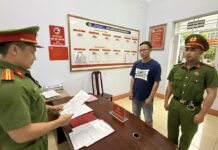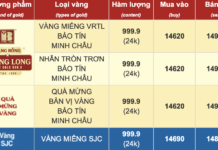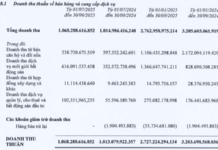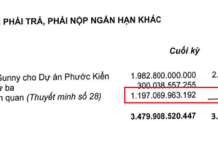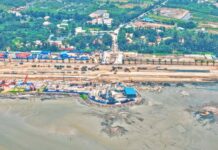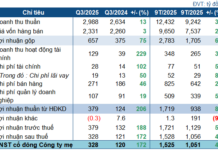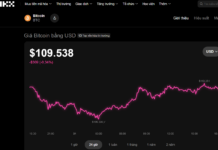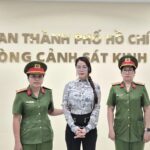In 2024, the agriculture, forestry and fishery sectors are targeting an export value of 54-55 billion USD. In the first month of the year, the whole sector brought in more than 5.15 billion USD, a year-on-year increase of 79.2%, laying a very positive foundation for the recovery and growth of businesses (DN) from now until the end of the year. That means the capital needs to serve the production and business of DN in the industry will increase significantly.
Expanding the credit package to 30,000 billion VND
In fact, the capital needs of the agriculture, forestry and fishery sectors have been growing strongly since the second half of 2023 thanks to the recovery of exports. At the online conference on boosting bank credit (NH) in 2024 that has just taken place, the leaders of the State Bank of Vietnam (SBV) informed about the 15,000 billion VND preferential credit package for the forestry and fishery sectors has been fully disbursed, completing 100% of the set objective even though the program’s deadline continues until June 2024.
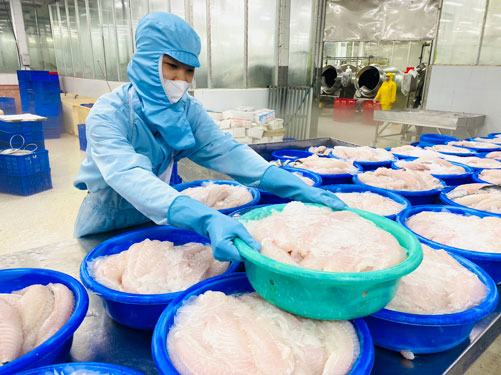
Commercial banks will enhance loans to meet the capital needs of businesses in the agriculture, forestry, and fishery sectors. Image: NGOC TRINH
With the achieved positive results, at the conference, SBV and commercial banks have agreed to expand the scale of the credit package to 30,000 billion VND to further support DN, promote agricultural credit.
Deputy Governor of the State Bank Dao Minh Tu encourages commercial banks to lend to the agriculture, forestry, and fishery sectors at lower interest rates than the average interest rate for loans and use the resources of the SBV to support DN and farmers.
In an interview with Báo Người Lao Động, Mr. Pham Toan Vuong, General Director of Agribank, said that only in the Mekong Delta region, banks currently have debts of more than 100,000 billion VND in agriculture, forestry, and fishery sectors. These are the sectors that banks always prioritize lending to.
Hồ Nam Tiến, General Director of LPBank, said that LPBank is allocating a package of about 5,000 billion VND for customers to borrow in the green credit field. Along with preferential credit packages, banks also improve loan approval processes; change the organizational model of operation in early 2024; shorten the approval and disbursement time for loans within 24 hours. Banks also proactively allocate credit limits for certain business units to enable customers to access loans quickly and efficiently.
“However, one of the difficulties and obstacles in the credit granting process is that many small and medium-sized enterprises have non-standard financial reporting. Banks have to use various sources of data in the loan decision-making process to ensure safety,” Mr. Ho Nam Tien said.
More flexibility in lending
Le Hang, Director of Communications of the Vietnam Association of Seafood Exporters and Producers (VASEP), highly appreciates the policy of the State Bank of Vietnam when it is about to add a 15,000 billion VND credit package for the forestry and fishery sectors, which is a good motivation for the industry in 2024.
According to Ms. Hang, currently, many farmers have abandoned shrimp and tra fish ponds, leading to a shortage of raw materials for processing plants, which significantly affects the output and export value of seafood this year. Small and medium-sized enterprises that supply raw materials are in great need of capital to maintain production.
“However, in the past year, enterprises in the industry still had difficulty accessing preferential loans because the procedures were very complicated – beyond their capacity. It is hoped that the implementation of the new credit package will receive the attention of localities so that the capital can be effectively and efficiently deployed,” Ms. Le Hang suggested.
The leader of a seafood company in Can Tho City also affirmed that the increase in the scale of the credit package is very necessary for businesses in the current difficult situation. However, this company suggests that the State Bank should direct commercial banks to promptly resolve procedures for businesses rather than delay and slow down the implementation as in the past.
“Banks also need to be flexible in lending depending on the time, avoiding the situation where businesses need to borrow 50 billion VND, but the bank grants a credit limit of up to 100 billion VND, and the surplus money is not used by the business. Meanwhile, when businesses need to borrow more, banks limit the credit limit, causing businesses to lack funds to buy raw materials. Farmers that sell through traders are very susceptible to price pressure,” the leader of this company said.
The General Director of a rice export company in the Mekong Delta also reflected that in the rice sector, businesses often lack capital during high harvest periods but they find it difficult to access credit. The reason is that banks are afraid of losing capital, so they lend very strictly, mainly based on collateral assets to establish credit limits.
“For example, a business with assets of 100 billion VND is only allowed to borrow a maximum of 70 billion VND. This amount of money only buys 5,000 tons of rice, which is very little compared to the export demand. In fact, rice businesses that have large collateral assets do not have many opportunities to enjoy unsecured loans based on export contracts. It seems that banks still consider the rice export business as a high-risk industry,” said the director of this company.
(To be continued)
(*) See Báo Người Lao Động from the edition dated February 22
Reducing procedures
Regarding loan-related documents and procedures, Mr. Nguyen Tuan Anh – Chief Inspector and Supervisor of Banks under the State Bank of Vietnam’s Inspection and Supervision Agency – said that he has requested credit institutions to differentiate the loan approval process for each product to shorten the disbursement time.
“I once borrowed from banks and saw that the loan procedures were very strict, but there are lending products that can reduce procedures for customers. For example, lending against savings books is relatively safe, but banks still require many documents to disburse loans. It is possible to research and minimize administrative procedures for customers,” said Mr. Nguyen Tuan Anh.







